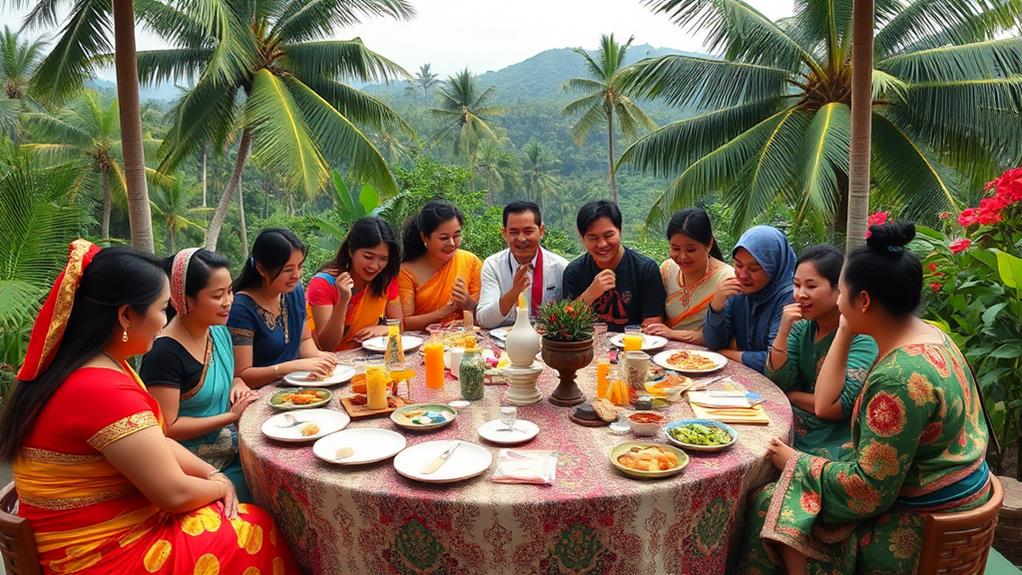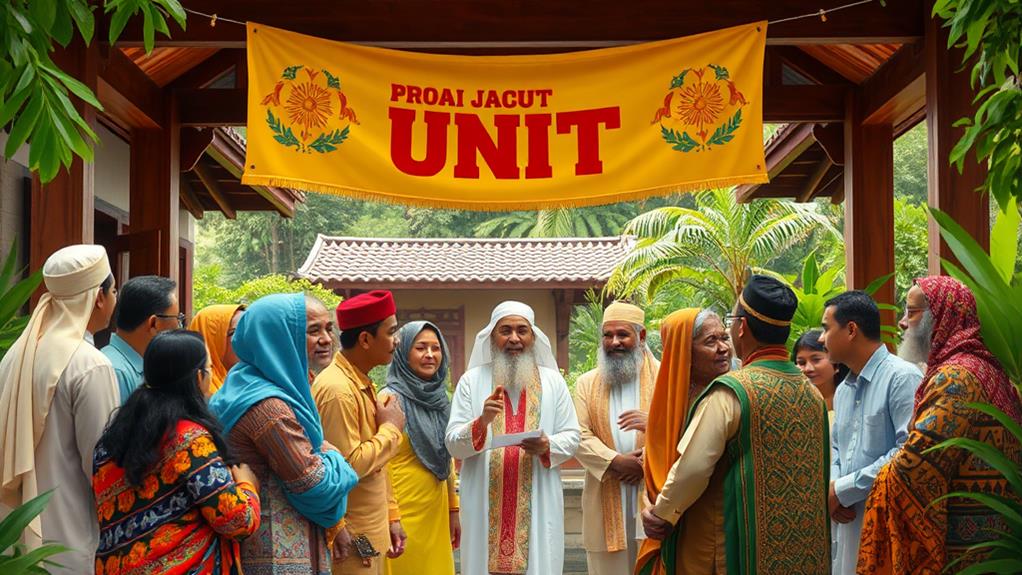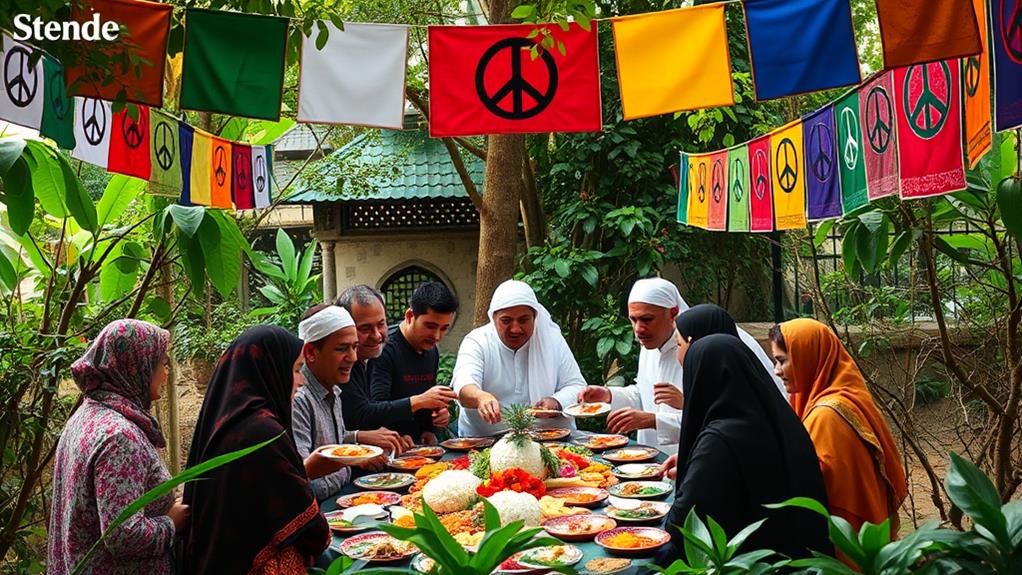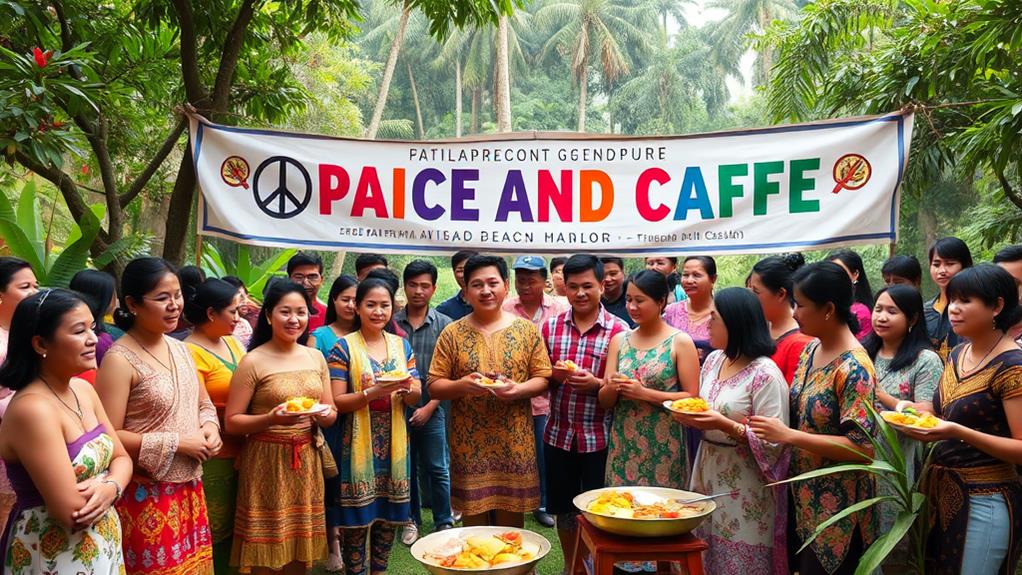Interfaith dialogue is crucial in the Philippines for fostering understanding and reducing conflict among diverse religious communities. This is achieved through initiatives like World Interfaith Harmony Week, which unites Christians, Muslims, and other faiths in promoting love and compassion.
Organizations such as UniHarmony Partners Manila support these efforts, emphasizing cooperation and community engagement to create a harmonious environment.
Legislative actions encourage interfaith activities to enhance tolerance. For instance, the Philippine government has implemented programs that promote interfaith dialogue and understanding, further encouraging harmony among different religious groups.
Youth involvement is essential in shaping a peaceful future. Young people are encouraged to participate in interfaith activities, highlighting the importance of empathy and shared values in promoting peace and understanding.
Importance of Interfaith Dialogue

Interfaith dialogue is a crucial bridge that connects diverse religious communities in the Philippines. It fosters understanding and reduces conflict among various religious groups, including Islam, Christianity, Buddhism, and indigenous beliefs. This dialogue was initiated by the Catholic Bishops Conference in 1990.
Interfaith dialogue promotes love for God, neighbor, and the common good. Events like World Interfaith Harmony Week, celebrated from February 1-7, showcase the active participation of these communities. Organizations like UniHarmony Partners Manila, established in 2011, have further strengthened interfaith cooperation. They bring together around 25 faith-based organizations in Metro Manila.
Interfaith dialogue encourages local communities to engage in acts of kindness and collaboration. Programs like "Neighbors in Harmony" enhance relationships among individuals of different faiths.
Youth seminars explore themes of love, mercy, and compassion. These gatherings showcase how diverse beliefs can unite people, fostering community unity.
By embracing interfaith dialogues, you contribute to a more harmonious society. Understanding and cooperation flourish among all religious groups in the Philippines.
Legislative Support for Harmony
Legislative Support for Harmony
Promoting harmony among diverse religious communities in the Philippines is gaining traction at the legislative level.
A proposed Senate bill advocates for interfaith activities during the first week of February each year to reduce conflicts stemming from differing beliefs and enhance religious tolerance across communities. This initiative aims to foster understanding and cooperation among different religious groups.
The Philippines is part of a global movement, with over 40 countries celebrating World Interfaith Harmony Week as a UN Observance Event.
The National Ulama Conference of the Philippines actively organizes events that foster inter-religious cooperation, demonstrating the country's dedication to legislative support for harmony.
Legislative Support for Interfaith Initiatives:
- Proposed Senate Bill: Promotes interfaith activities in February to enhance understanding among different religious groups.
- Senator Loren Legarda: Advocates for religious tolerance to reduce conflict in communities.
- National Ulama Conference: Organizes inter-religious events to foster cooperation among different religious groups.
These initiatives contribute to a long-term vision for a more harmonious society through effective communication and mutual respect.
Key Interfaith Events in the Philippines

The Philippines has implemented various initiatives to promote interfaith harmony among its diverse religious communities.
The World Interfaith Harmony Week is a significant annual event celebrated from February 1-7. This week aims to promote love of God, neighbor, and the common good through engaging community activities. During this week, people from different faiths come together to foster understanding and peaceful coexistence.
To address misunderstandings between Islam and Christianity, the Catholic Bishops Conference has been working since 1990 to enhance peace and cooperation. Another key organization, UniHarmony Partners Manila, was formed in 2011 to unite around 25 faith-based organizations and promote interfaith dialogue. Their efforts were recognized with the second prize in the King Abdullah II World Interfaith Harmony Week Awards in 2016.
Youth seminar-workshops, such as the one held on February 2, 2017, bring together students from diverse religious backgrounds to discuss essential themes like love, mercy, and compassion.
The "Neighbors in Harmony" initiative, launched in 2012, encourages local communities to foster kindness across cultural divides. These events weave a vibrant tapestry of interfaith dialogue, bridging gaps and promoting understanding among various religious beliefs.
Contributions of Religious Organizations
Religious Organizations Foster Understanding and Cooperation
In the Philippines, religious organizations play a vital role in building bridges between different faiths.
Through interfaith dialogue, they promote religious liberty and tolerance, allowing various beliefs to coexist peacefully. The Catholic Bishops Conference has been proactive in this effort since 1990, initiating discussions to address conflicts between Islam and Christianity.
UniHarmony Partners Manila, formed in 2011, unites around 25 faith-based organizations and has gained recognition for its efforts, winning second prize in the King Abdullah II World Interfaith Harmony Week Awards in 2016.
Religious Organizations Provide Critical Support in Times of Crisis
Organizations like Caritas Manila and Islamic Relief Worldwide have collaborated to provide food assistance and resources during crises, such as the COVID-19 pandemic.
Their joint efforts highlight a commitment to tackling pressing social issues like poverty and climate change. The signing of a Unity Statement by eight Christian groups further emphasizes the importance of interfaith cooperation in addressing human rights and communal challenges.
By working together, these religious organizations uplift their communities and set an inspiring example of harmony and solidarity in the Philippines.
Global Interfaith Initiatives

Global Interfaith Initiatives Foster Understanding and Cooperation
Global interfaith initiatives have emerged as powerful platforms for fostering understanding and cooperation among diverse faith communities.
The World Interfaith Harmony Week, proposed by H.M. King Abdullah II of Jordan and adopted by the UN in 2010, is a prominent example. This initiative encourages interfaith dialogue by emphasizing love for God and neighbor, promoting collaborative efforts that unite faith communities for the common good.
Local Organizations Engage in Interfaith Dialogue
In the Philippines, organizations like UniHarmony Partners Manila actively engage in World Interfaith Harmony Week, working with around 25 faith-based groups in Metro Manila.
These celebrations include seminars, workshops, and community initiatives that inspire understanding among diverse faiths. By participating in these activities, individuals help cultivate an environment of peace and coexistence, where religious traditions can interact positively.
Recognizing Successful Collaborative Efforts
The King Abdullah II World Interfaith Harmony Week Awards highlight successful collaborative efforts that enhance harmony.
Youth Engagement in Dialogue
Youth Engagement in Dialogue
Youth are crucial in shaping the future of interfaith dialogue, leading to meaningful change in communities. A 2017 seminar at the University of Sto. Tomas exemplified this, gathering 100 students from diverse faiths, including Christians, Muslims, and Buddhists. This event highlighted the importance of compassion and understanding, demonstrating how youth can transcend religious boundaries.
Personal stories and group discussions help overcome prejudices and redefine religion. Participants learned that religion isn't just about doctrine, but about love, belief, sacrifice, and peace. These dialogues foster respect, allowing youth to appreciate different perspectives.
For example, Christians emphasized love and mercy, Muslims stressed compassion, and Buddhists highlighted understanding.
World Interfaith Harmony Week activities help youth explore the significance of religious harmony. By participating in interfaith dialogue, today's youth not only enrich their own lives but also pave the way for a more harmonious future, where respect and understanding flourish among all.
How Does Music Play a Role in Promoting Interfaith Dialogue and Harmony in the Philippines?
In the Philippines, religion and music exploration have played a significant role in promoting interfaith dialogue and harmony. Through collaborative musical performances and concerts, people from different religious backgrounds come together to celebrate diversity and foster understanding. Music has the power to bridge cultural and religious divides, creating a sense of unity and mutual respect.
Community Efforts for Harmony

Community Efforts for Harmony
Promoting harmony among different faiths is crucial in the Philippines. The Neighbors in Harmony Initiative, launched during World Interfaith Harmony Week, encourages local communities to sponsor activities that promote kindness and unity among diverse cultural backgrounds.
In areas like Zamboanga City, where Christian and Muslim communities coexist, local leaders participate in community events that emphasize respect and love. These gatherings feature priests and imams, fostering interfaith dialogue that addresses community issues through shared experiences.
By highlighting positive stories of collaboration, the initiative promotes forgiveness and understanding.
The Department of Social Welfare and Development supports the initiative, which has gained traction and paves the way for stronger relationships within the community.
Through collective efforts, a culture that values peace and mutual respect can be created, making a significant impact on society and nurturing a brighter future for everyone.
Cultural Concepts Promoting Unity
Pakikipagkapwa-tao: A Key to Unity in the Philippines
In the Philippines, pakikipagkapwa-tao is a cultural concept that promotes unity among diverse religious groups. This principle emphasizes the importance of sincere relationships and inter-religious cooperation, creating a strong foundation for community support.
By embracing pakikipagkapwa-tao, individuals cultivate a spirit of compassion and solidarity, bridging gaps between different faiths.
During the COVID-19 pandemic, the neighborly spirit of pakikipagkapwa-tao was evident in the emergence of community pantries. People from various backgrounds came together to support one another, showcasing the power of shared cultural values.
Feeding the hungry isn't just a communal effort, but a moral obligation across many religions in the Philippines. This highlights how compassion transcends belief systems, promoting unity.
To foster cooperation and understanding among diverse faiths, embrace pakikipagkapwa-tao. This cultural concept not only enriches relationships but also strengthens the fabric of society, paving the way for a more inclusive and united Philippines.
Questions and Answers
What Are the 4 Rules of Interfaith Dialogue?
Rule 1: Respectful Listening
Engage in interfaith dialogue by actively listening to others' beliefs and perspectives.
Avoid interrupting or dismissing others' views, and instead, focus on understanding their opinions.
Rule 2: Mutual Understanding
Prioritize understanding by seeking clarification when needed and asking open-ended questions to encourage sharing.
This helps build trust and fosters a deeper comprehension of differing beliefs.
Rule 3: Common Values and Shared Goals
Identify common values and shared goals that unite people of different faiths.
Look for overlapping principles, such as compassion, justice, or respect, and explore ways to work together towards a common objective.
Rule 4: Cultural Sensitivity and Open Communication
Practice cultural sensitivity by being aware of cultural nuances and avoiding stereotypes.
Encourage open communication by creating a safe and inclusive environment where participants feel comfortable sharing their thoughts and opinions.
How Does Interfaith Dialogue Help Religious Traditions Bring Peace to the World?
Interfaith dialogue is essential for fostering peaceful coexistence among diverse religious traditions. It achieves this by promoting mutual respect and understanding, which enables community engagement and social justice initiatives.
For instance, the common value of compassion shared by many religions inspires collective efforts to address poverty and inequality.
Through dialogue facilitation, participants learn to appreciate cultural differences. This helps pave the way for conflict resolution by breaking down stereotypes and misconceptions.
In Indonesia, interfaith dialogue has successfully resolved communal conflicts and promoted peaceful coexistence among Muslims, Christians, and Hindus.
Collaborative projects build bridges that enhance religious tolerance and acceptance. For example, interfaith groups have worked together to provide disaster relief and promote environmental sustainability.
These initiatives create a more harmonious world, where everyone feels valued and included in the quest for peace.
By embracing interfaith dialogue, religious traditions can work together to bring peace to the world.
By doing so, they can create a more just and equitable society, where everyone can thrive and reach their full potential.
What Is Interfaith Dialogue and Why Is It Important?
Interfaith dialogue is a meaningful conversation between different religious traditions aimed at fostering cultural understanding and mutual respect. This type of conversation helps individuals discover shared values and personal experiences, promoting religious tolerance. For instance, understanding the importance of compassion in both Christianity and Buddhism can lead to a deeper appreciation for each other's beliefs.
Engaging in interfaith dialogue can lead to effective conflict resolution and community engagement. This is because it allows diverse groups to collaborate and find common ground. For example, in a community with both Muslim and Christian residents, interfaith dialogue can facilitate joint efforts to address local issues, such as poverty or education.
By learning historical perspectives and participating in global initiatives, individuals can contribute to a more peaceful and harmonious world. Understanding the historical events that have shaped different religious traditions can foster empathy and appreciation.
Moreover, participating in global initiatives, such as the World Interfaith Harmony Week, can promote unity and cooperation among people of different faiths.
What Is the Role of Interfaith Harmony?
Interfaith harmony is essential for promoting cultural understanding and mutual respect among diverse communities. It brings people together, allowing them to share values and practices that foster religious tolerance.
For instance, interfaith dialogue groups can facilitate open discussions, helping to break down stereotypes and misconceptions.
Effective conflict resolution is critical in promoting peacebuilding efforts. Interfaith harmony provides a framework for resolving disputes peacefully, leading to social cohesion.
For example, in areas with a history of religious conflict, interfaith initiatives have helped to reduce tensions and promote understanding.
Inclusive practices are vital in creating an environment where everyone feels valued. By embracing diversity, individuals can contribute to a more harmonious society.
For instance, interfaith events and celebrations can bring people from different backgrounds together, promoting a sense of community and mutual respect.